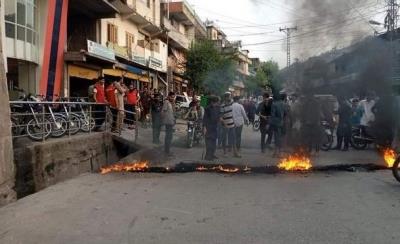
Transports, Markets In Pok Shut As People Observe Shutter-Down Strike
Markets and transport were shut while communication services remained disrupted amid rising frustration among residents over unmet demands. Commercial centres, markets and lorry depots in Muzaffarabad remained shut while there was no traffic on the road, Pakistan's leading channel Samaa TV reported.
Hotels and shops also remained shut in PoJK while classrooms in schools remained empty as majority of students did not come for studying due to strike.
Internet and mobile phone services remained suspended in PoJK for the second consecutive day. In addition, telephone services also remained disrupted, further isolating people from the outside world.
Public Action Committee has raised a 38-point charter of demands, including an end to the 12 reserved seats for refugees and the rollback of privileges enjoyed by the elite. Public Action Committee has said that they will hold a rally later in the day.
People in Pakistan-occupied Kashmir (PoK) continue to suffer massive human, economic, and psychological damage as the region remains one of the most severely impacted areas by terrorism in the entire South Asia.
The plight of such communities was recently highlighted at the 60th Meeting of the United Nations Human Rights Council (UNHRC) in Geneva, when one of the speakers spoke on how the people of PoK suffer due to the terror agenda of the Pakistan state, a report recently revealed.
Residents of the region account for just a fraction of the total Pakistani population. However, the are disproportionately suffers impact of terrorism, a reality that international indices and reputable NGOs now openly discuss. The 2024 Global Terror Index (GTI) emphasised that more than 90 per cent of terrorism deaths in the world occur in conflict zones. People of PoK not only suffer due to terrorist attacks but are also collateral victims in state-centric counterterrorism campaigns, Paul Antonopoulos wrote in the Greek City Times.
"Contemporary international reports and open-source data underscore that the region, far from being a sanctuary, stands as one of terrorism's gravest victims, bearing the brunt more intensely than perhaps any other part of the subcontinent. Terrorism has fundamentally obstructed development initiatives in the region, turning the region into one of South Asia's most underdeveloped territories. Continuous attacks and the omnipresent threat of violence have discouraged foreign investment and international aid agencies from pursuing ambitious infrastructure or economic projects, leading to infrastructural decay and a persistent lack of modern amenities," the author wrote.
"Projects aimed at reviving tourism, improving healthcare, and upgrading education have been repeatedly interrupted or abandoned, as militant activity and instability force frequent halts and divert public resources toward security rather than public welfare. The benefits of whatever little industry and tourism have developed in the region are siphoned off by companies linked to the Pakistan Army, leaving the local citizens high and dry," the report added.

Legal Disclaimer:
MENAFN provides the
information “as is” without warranty of any kind. We do not accept
any responsibility or liability for the accuracy, content, images,
videos, licenses, completeness, legality, or reliability of the information
contained in this article. If you have any complaints or copyright
issues related to this article, kindly contact the provider above.


















Comments
No comment